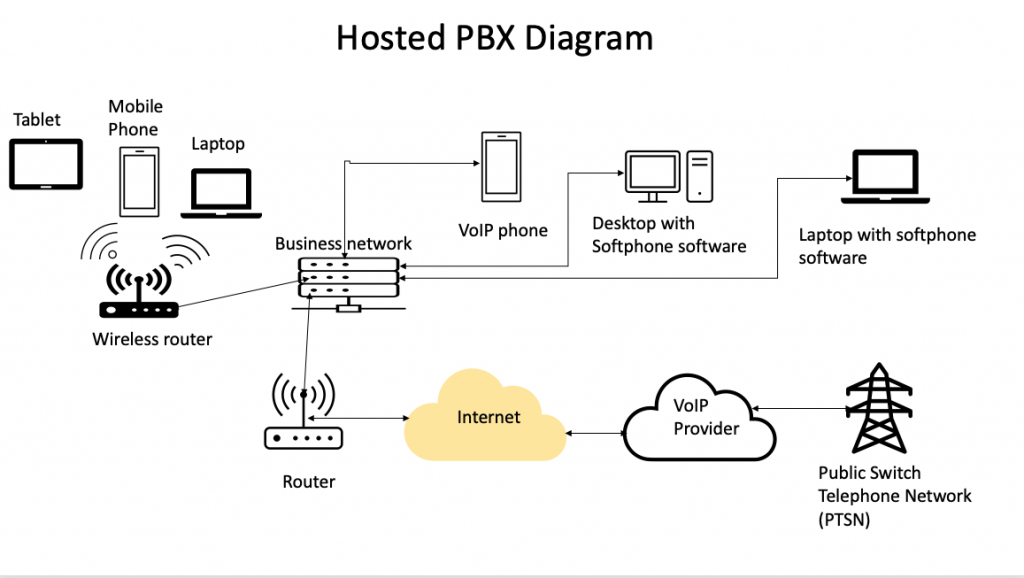Key takeaways
Hosted Private Branch Exchange (PBX) systems are growing in popularity because they are easy to use and do not require some of the bulky traditional phone equipment that can be expensive. Hosted PBX systems do not require hook switches that connect and disconnect traditional phone calls, copper wires, landline phones, or Public Switched Telephone Networks (PSTNs) to operate.
What is a hosted PBX?
A hosted PBX is a cloud-based phone system that replaces the landline or traditional phones installed in business offices or residential homes. A cloud-based hosted PBX solution uses Voice over Internet Protocol (VoIP) and the Internet to make and receive phone calls. A PBX service provider manages all equipment in a cloud-based data center, delivering secure and reliable phone services through an internet connection.
What is the difference between a hosted PBX and a non-hosted PBX system?
Cloud-based hosted PBX systems are maintained by the service provider. The service provider supports all the hardware at a data center for hosted PBX systems, including the data and software. The hosted PBX customer only requires VoIP phones, mobile phones, and a signaling device that behaves like a switch, allowing calls to be distributed to different telephones in an office setting. A hosted PBX system can also communicate with traditional phones over the PSTN.
A non-hosted PBX will have all its equipment on-premises, which the using organization maintains. A non-hosted PBX system can customize its features more than a hosted PBX system, allowing a business to customize its features to meet any unique business requirements. Non-hosted PBX systems connect to an internal device through an extension number, and non-hosted PBX systems need a SIP trunk to communicate over the PSTN. Non-hosted PBX systems allow more flexibility and scalability for growing organizations.
What is the technology behind a hosted PBX system?
Hosted PBX systems need a service provider, a VoIP phone, routers, category five cabling, and an Internet connection. Additionally, hosted PBX phone systems offer useful features, applications, and services, allowing management to configure options for each employee by using an application similar to RingCentral Admin Portal with a web browser.
What are the benefits of using a hosted PBX?
Significant cost savings are generated when a business does not have to purchase any physical infrastructure, eliminates maintenance costs, and requires no upgraded hardware purchases every 3-5 years. Besides cost savings, here are some other tangible benefits when using a hosted PBX phone system:
Flexibility
Hosted PBX solutions provide businesses with flexibility in multiple ways. Employees can connect to the cloud-hosted PBX from anywhere. Users can easily swap office calls from desk phones to softphones or mobile devices and answer calls in transit. The flexibility built into a hosted VoIP system allows you to reach out to customers virtually or with a toll-free number remotely or in the office.
Plug-and-play hosted telephone system
The plug-and-play hosted PBX can have a business up and running quickly with a miniscule impact on operations. The training involved in learning how to use the hosted VoIP system is easy to absorb due to the intuitive interface.
Cloud hosted PBX systems enhance customer support
The call routing feature accepts inbound and outbound calls, including sending emails and performing web and chat sessions from anywhere using the cloud contact center module, improving customer service responsiveness. The contact center module improves call resolution times and provides training that helps new call agents learn how to use the PBX system quickly.
Increase redundancy and disaster recovery
Hosted PBX phone system service providers have dedicated resources and servers in different cities worldwide with multiple transit providers. The software-based failover mechanism is automatic, meaning an event or natural disaster that occurs can initiate the failover servers and redundant routes to be operational in seconds.
Advanced features
Cloud-hosted PBX provides access to advanced features at no extra cost including call control, call recording, queues, and wallboards, and a visual display of data showing real-time information related to provided PBX services available.
Real-time monitoring and analysis
A hosted VoIP PBX system provides real-time statistics and monitoring of all missed or ongoing calls. The real-time monitoring can evaluate each call agent’s performance that can be collated into a report for further analysis using statistical tools to generate the average time per call and the median of all calls.
Hosted VoIP PBX systems are secure and reliable
Cloud-based PBX systems encrypt and store data off-site, making it more difficult for attackers to access. The service provider manages and executes the software upgrades, firewalls, and security patches using their skilled IT professionals to ensure the VoIP system is secure and functioning correctly around the clock.
Collaboration improves when using a hosted PBX system
A hosted PBX solution enhances communication with its availability of different communication options, including video conference calls, chat or web sessions, and audio calls available anytime and anywhere. Users can create workspaces for chat sessions or video conference calls to discuss an unplanned emerging issue if required.
What are the key features of a hosted PBX?
Hosted PBX systems provide many advanced features that would cost money if you were using a traditional PSTN phone, and some of these features are not available on traditional phones. Cloud PBX systems include in their solution auto-attendants that route calls without human intervention, call-forwarding, voicemail-to-email, conference calls, chat sessions, and other useful features, such as:
Case studies of successful PBX implementation
PerryGolf
PerryGolf is a company that specializes in high-end golf trips around the world, and it was founded in 1984 by two brothers. Before PerryGolf selected VirtualPBX as their service provider, they constantly faced communication challenges due to a lack of integration with offices in different continents.
After PerryGolf selected the new service provider, VirtualPBX, Gordon Dalgleish, the co-founder of Perry Golf, said, “At the end of the day, our business has grown because of a high service level. We deal with type A personalities that have high service expectations. We sell a premium service. We’ve got a premium brand. At the same time, we’ve got to deliver the service.”
Using VirtualPBX, a premium VoIP solution provider, has successfully met PerryGolf’s expectations for eighteen years by removing the disconnect between the United States and United Kingdom business offices.
1st Classic Transportation
Another one of VirtualPBX’s customers raved about their 7/24 customer support and the features and affordability of the VirtualPBX solution. Christopher Fagbolu, the president and CEO of 1st Classic Transportation, provides limousine transportation services from the airport to specific locations for executives and leisure customers.
Texting and other communication options, like the softphone on mobile devices, helped Mr. Fagbolu’s company overcome the lockdown challenges during the COVID pandemic.
Mr. Fagbolu stated, “VirtualPBX is more affordable with more features in comparison with other phone system providers, and we intend to use it more vigorously to communicate with customers.”
How does a hosted PBX work?
A hosted PBX solution requires businesses to have a reliable internet connection, a proven host PBX service provider, and the VoIP phones provided by the service provider. VoIP phone calls work similar to when an email is sent. When you use your VoIP phone to call a traditional telephone, the call will traverse to your hosted PBX service provider.
Since this call is going to a residential phone number in this example, it will be transferred to the PSTN by the hosted PBX data center equipment that converts the digital signal to an analog signal before it reaches the PSTN. Inside the PSTN, the call continues to move through gateways until it reaches the nearest central office where the recipient lives, and the person receiving the call is notified by ringing their phone. The process works in reverse, using gateways to convert analog calls to a digital format when a traditional phone user calls a VoIP number.
VoIP calls to a mobile device will be converted to a digital signal and transmitted over the Internet. The signal will be converted to analog before reaching its destination so the caller and the person called can communicate. VoIP calls to another VoIP device use the Internet. See Figure 1.

What are some reputable cloud-based providers?
With any service you purchase, you want to be sure it meets your business needs. One of the best ways to start looking for the best hosted PBX service providers is to use a reputable source that has already evaluated the best PBX service providers. The evaluation includes pricing, key features, and a 5-point rating evaluation. This type of homework is already done for you. Use the link here as a starting point for evaluating the selected cloud-based PBX service providers: Best cloud-hosted PBX service providers for business in 2023
How to choose the right hosted PBX provider
There are a lot of factors to consider when trying to select the best hosted PBX provider for your organization. Your potential growth rate is one of the first considerations for picking a PBX service provider if your business grows. As a growing organization, you want the same service provider to meet your future needs. So, a service provider that caters to small to mid-size businesses is not a good match, even if the cost is cheaper than that of other providers. So, scalability is an important factor. Does the payment plan and cost meet your needs today, and will they in five years when you add inflation into today’s prices?
What are your essential features needed? Does the service provider offer those features, and how do the features compare operationally to another vendor? Whatever you have read needs to be evaluated and tested to be sure the most crucial feature you need works as advertised. Customer support is another important consideration. So, will your company need 24/7 support, or does your organization only need twelve hours daily for weekday support? If you can evaluate your company with these considerations, you will likely be happy with your selected PBX service provider.
VoIP and PBX
Voice over Internet Protocol (VoIP) is an essential component of a PBX service provider, including customer service and call center software. A good question to ask a PBX service provider is what customer service software and call center software solutions are integrated with your PBX solution to provide the best customer support to your customers. Here are additional software products to evaluate that can be featured partners of a PBX vendor solution:
You may or may not select any of the products reviewed, but reviewing the links provided should give you a baseline that helps clarify the exact products you want in an integrated hosted PBX service provider solution that includes vital customer support requirements to meet the full complement of your business needs.





